|
|
|
Sort Order |
|
|
|
Items / Page
|
|
|
|
|
|
|
| Srl | Item |
| 1 |
ID:
146982
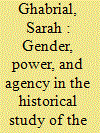

|
|
|
|
|
| Summary/Abstract |
It is fair to say that some of the most vibrant work—and most challenging questions—surrounding “agency” and its intelligibility have come out of feminist scholarship on the “Muslim world,” broadly defined. This piece considers the transdisciplinary lives of agency as analytic tool, its uses and limitations, its particular proximity to gender-critical research, and, in turn, seeming synonymization with women.
|
|
|
|
|
|
|
|
|
|
|
|
|
|
|
|
| 2 |
ID:
128453
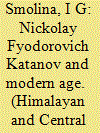

|
|
|
|
|
| Publication |
2013.
|
| Summary/Abstract |
The year 2012 marked the celebration of the 150th birth anniversary of outstanding Russian scholar, orientalist, turkologist, doctor of comparative philosophy Nickolay Fyodorovich Katanov. One may admit that in Khakassia during the recent 150 years a researcher of such high level as Nickolay Fyodorovich Katanov has not been born yet.
|
|
|
|
|
|
|
|
|
|
|
|
|
|
|
|
| 3 |
ID:
178903
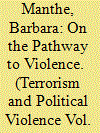

|
|
|
|
|
| Summary/Abstract |
West German society faced the emergence of a new calibre of right-wing terrorism in the 1970s. Right-wing terrorist groups evolved that showed themselves willing and able to commit violent attacks such as bombings and murder. This article explores the genesis and development of right-wing terrorism in West Germany between 1970 and 1980 while examining 22 identifiable groups and lone actors and taking into consideration the radicalization within the far right as well as the prevailing social conditions. West German right-wing terrorism until 1990 has remained a blind spot in historiography to this day. This article contributes to historical terrorism studies as well as to studies into the far right while applying historical-qualitative methods and interpreting primary sources. Using an approach informed by social history, this paper sheds new light on the individual participants, groups, and networks of right-wing terrorism as well as on its topics and targets. While taking into account a more dynamic definition of right-wing terrorism, this paper disengages from definitions that identify terrorism solely as a threat to the state itself. This makes possible a multidimensional approach employing contemporary history and studies in both terrorism and right-wing extremism.
|
|
|
|
|
|
|
|
|
|
|
|
|
|
|
|
| 4 |
ID:
134282
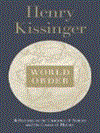

|
|
|
|
|
| Publication |
New Delhi, Penguin Books India Pvt.Ltd., 2014.
|
| Description |
420p.Hbk
|
| Standard Number |
9780241004265
|
|
|
|
|
|
|
|
|
|
|
|
Copies: C:1/I:0,R:0,Q:0
Circulation
| Accession# | Call# | Current Location | Status | Policy | Location |
| 057919 | 909/KIS 057919 | Main | On Shelf | General | |
|
|
|
|
| 5 |
ID:
086937
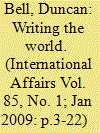

|
|
|
|
|
| Publication |
2009.
|
| Summary/Abstract |
In order to grasp some of the key intellectual developments and trends that shaped the global politics of twentieth century and continue to shape our own world-neo-classical economics, modernization theory, deterrence theory, the democratic peace, among others-it is necessary to explore the history of the human sciences. It is important, in other words, to examine the role of the modern research university in producing and diffusing ideas about the self, society, the economy and world order. International Relations (IR), and political science more generally, played a significant role in this story. In recent years we have seen a growth of interest in the history of IR, though it is still an underdeveloped area of research. Among other things, scholars have shown that many of the foundational myths of the discipline-the views that inform textbook understandings of the past and present-are deeply flawed. This article first surveys this recent work, highlighting its strengths and weaknesses, and then proceeds to offer some thoughts on future directions for research. It identifies a range of questions and topics that have yet to be adequately addressed, and draws on the latest methodological work in intellectual history, highlighting some new interpretative approaches that can enrich scholarship in this area.
|
|
|
|
|
|
|
|
|
|
|
|
|
|
|
|
|
|
|
|
|